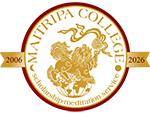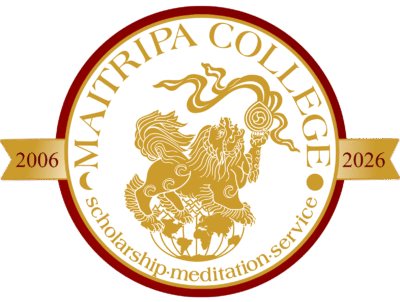The Three Most-Often-Asked Questions
(Answered by Namdrol Miranda Adams, EdD, Dean of Education)
My favorite answer to this question comes from our teacher and President, Yangsi Rinpoche, who usually laughs when someone asks this, and says, “you can do anything.”
I think this bears some consideration. Rinpoche, who is a very modern teacher trained in a very traditional system (Sera Je, one of the great Tibetan Buddhist monastic colleges), is the founder and creator of the program of study at Maitripa College. In addition to being known as a great scholar and practitioner among the Tibetan community, Rinpoche has also had the very clear advantage in the west of being able to approach the development of education systems here with some amount of lucidity and genuine intent, unsullied by much in the way of complex motivation. Rinpoche came to this country, quite simply, to teach and to serve.
To Rinpoche, the purpose of an education at Maitripa, of an education anywhere, is to facilitate the ability of the student to do anything. This speaks to what in fact were the original goals of most education programs in the early days of the United States, which were intended to shape not only the intellect of the students, but also their “character,” those qualities of mind and spirit that cannot be learned, but can only be nurtured. As our society has developed, our priorities have shifted, and we are currently in the midst of a movement away from valuing holistic education that holds as its primary goal the development of the full potential of the human being. This question often arises from a grounding in that place.
At Maitripa College, through careful course design and intentional integration of both traditional and modern methods of teaching and learning, we are dedicated to providing an educative experience that is holistic, that supports not only your acquisition of knowledge and skills, but also the integration of that knowledge into your life, relationships, and service to the world. An education at Maitripa College can give you a foundation for becoming a Chaplain or Spiritual Care provider, a leader in your community, a translator, or scholar or many other things, but most of all, on the basis of an ancient tradition that teaches wisdom and compassion as two wings of a bird in flight, it will help you create the internal resources and resilience to do anything for the rest of your life.
This question is also often asked accompanied by some level of anxiety, and the answer may do little to assuage it.
The answer is: this is completely up to you. We have one student here who has four children and is making it work, and others find that the demands of their work/home/families are simply too much.
In general, I advise people that it is likely not possible to do this program full-time and continue to make equal time for your life, job, partner, and children all at once, although some combination of that usually works out fine. But again, this is up to you to figure out. The Maitripa College program is challenging, both in terms of the content you will learn and in terms of the transformative elements that shape it, and that is usually surprising to incoming students. For this reason, we advise people to be patient with this part of the process, ask their families to be patient, and give themselves time and space to figure it out.
Additionally, historically at Maitripa students have attended and graduated from our programs while enrolled as both full time and/or part time students. This is an important option to keep in mind. It is completely possible to do our degree programs as a part-time student, and doing so may be a better choice for you.
Many, many students who start at Maitripa College approach me with this question early on, often with some anxiety.
And the answer is absolutely not.
At Maitripa College, we have no vested interest in what belief system you ascribe to or do not ascribe to. However, to be transparent, Maitripa College is a Buddhist environment, and we do follow Tibetan Buddhist religious norms in our meditation hall and other spaces. You are welcome to join in as you feel comfortable and you are also welcome to abstain. We only ask that you are respectful of everyone around you.
I also think it is important to note here that the Nalanda tradition of Buddhist thought, from which Tibetan Buddhism is directly derived, is a dialectical tradition that relies entirely on the questioning, discussion, and debate of the statements found in the texts. In the Ghanavyuha Sutra (Sutra of Dense Array), Buddha himself famously said: “O bhikshus and wise men, just as a goldsmith would test his gold by burning, cutting, and rubbing it, so you must examine my words and accept them, but not merely out of reverence for me.”
The use of reasoning and dialectical discourse as a method to understand the teachings is a hallmark of this tradition, and in that spirit we welcome and invite questions and challenges grounded in a genuine interest in understanding in our classes, discussion sections, and community. Without such dialogue, from our perspective, we could hardly claim to be an educational institution.
Academic & Student Life FAQs
Maitripa College offers three enrollment categories:
- Degree Program Students are Oregon students who have applied, been offered admission, and matriculated into either the Master of Divinity or Master of Arts in Buddhist Studies programs.
- Continuing Education Students are Oregon students who are enrolled in classes for credit, receive a grade, transcript, and credit hours for completed courses. Continuing Education Students are not eligible to register as auditors. Courses completed may be applied towards future degree requirements within a limited time frame.
- Auditing Students are non-Oregon students. Auditors will not receive a grade, transcript, or graduate credit for courses completed. Auditors are expected to participate fully and attend all online classes synchronously or as otherwise directed by faculty.
To keep the standard of excellence and the classroom experience rich for all students, we require that everyone comes to class and is prepared to the best of their ability. Our classes are small and personalized and your opinions, curiosities, challenges, and insights contribute to enrich the course. During Spring 2022, enrolled students agree to uphold the following expectations:
- All students, whether enrolled for credit or auditing, are expected to participate fully in the class, in accordance with the scheduled onsite or online delivery formats
- All students, whether enrolled for credit or auditing, are expected to attend online classes synchronously
- Degree Program and Continuing Education students are expected to attend all on-site classes in person, unless they have a pre-approved attendance waiver
- Auditors are invited to attend on-site classes in person, view on-site class recordings asynchronously, or otherwise arrange with faculty access to course content during onsite weeks of the semester.
During the 2020-2021 academic year and into Spring of 2022, in accordance with policies and guidelines from Local, State, and National governance pertaining to education during the global coronavirus pandemic, Maitripa College courses have been offered online for credit. Auditing options were created for use during this public health crisis and do not carry graduate credit nor a transcript; auditors pay full tuition and are expected to participate fully in courses. Many of these permissions were extraordinary and exception, and some carry forward into the current academic year. Please check the current semester link here or contact registrar@maitripa.org with questions.
My favorite answer to this question comes from our teacher and President, Yangsi Rinpoche, who usually laughs when someone asks this, and says, “you can do anything.”
I think this bears some consideration. Rinpoche, who is a very modern teacher trained in a very traditional system (Sera Je, one of the great Tibetan Buddhist monastic colleges), is the founder and creator of the program of study at Maitripa College. In addition to being known as a great scholar and practitioner among the Tibetan community, Rinpoche has also had the very clear advantage in the west of being able to approach the development of education systems here with some amount of lucidity and genuine intent, unsullied by much in the way of complex motivation. Rinpoche came to this country, quite simply, to teach and to serve.
To Rinpoche, the purpose of an education at Maitripa, of an education anywhere, is to facilitate the ability of the student to do anything. This speaks to what in fact were the original goals of most education programs in the early days of the United States, which were intended to shape not only the intellect of the students, but also their “character,” those qualities of mind and spirit that cannot be learned, but can only be nurtured. As our society has developed, our priorities have shifted, and we are currently in the midst of a movement away from valuing holistic education that holds as its primary goal the development of the full potential of the human being. This question often arises from a grounding in that place.
At Maitripa College, through careful course design and intentional integration of both traditional and modern methods of teaching and learning, we are dedicated to providing an educative experience that is holistic, that supports not only your acquisition of knowledge and skills, but also the integration of that knowledge into your life, relationships, and service to the world. An education at Maitripa College can give you a foundation for becoming a Chaplain or Spiritual Care provider, a leader in your community, a translator, or scholar or many other things, but most of all, on the basis of an ancient tradition that teaches wisdom and compassion as two wings of a bird in flight, it will help you create the internal resources and resilience to do anything for the rest of your life.
The majority of MDiv graduates pursue a career in chaplaincy or spiritual care, but it is also a springboard for other studies and careers. It is excellent preparation for continued graduate training in counseling, spiritual direction, doctoral studies, education, and so forth. The MDiv is also a masters level academic degree that can prepare one for leadership in spiritual communities, non-profits, and schools.
Maitripa College does not offer student housing at this time, so you will need to make housing arrangements on your own. We are happy to connect you with other students who may wish to share housing or if we are aware of a community member who is making housing available, but it will be up to you to evaluate the situation and make arrangements.
CE credits accrued from successfully completed courses may be applied toward degree requirements, should the student gain admission to a degree program in the future. Currently, up to 24 credits may be internally transferred from CE into a degree program for courses taken within recent years prior to an offer of admissions to a degree program.
No. If a degree program is not feasible, people are encouraged to enroll as Continuing Education (CE) students at the college. CE enrollment is designed for those unable to start or without need to complete a degree program but who still want to improve their knowledge of Buddhist philosophy, meditation, language, and history, or to obtain skills to enhance their professional life, or for personal spiritual formation. More information about CE enrollment can be found here.
To keep the standard of excellence and the classroom experience rich for all students, we require that everyone comes to class and is prepared to the best of their ability. Because our classes are small and personalized, your opinions, curiosities, challenges, and insights contribute to enrich the course. We’ve observed in the past that students who choose an audit option tend not to be as committed to the full classroom experience. For these reasons, Maitripa College currently does not have an standard Audit enrollment option.
*In 2020-2021, in accord with policies and guidelines from Local, State, and National guidelines pertaining to education during the global coronavirus pandemic, Maitripa College courses have been offered online. Auditing options were created for use during this public health crisis and do not carry graduate credit nor a transcript; auditors pay full tuition and are expected to participate fully in courses.
During the course of your education here, you’ll probably learn some classical Tibetan language whether you intend to or not! One of our classical Tibetan language professors in the past often made the point that pursuing the study of Tibetan language is itself a spiritual practice. Some instructors will weave together Tibetan and English to skillfully convey the meaning of assigned texts. In addition, some guest instructors teach in Tibetan with English translation. Formal study of Tibetan, in courses offered by the college, is currently required for those in our MA program. Given the value of studying Tibetan, this opportunity is encouraged for our MDiv program students.
We encourage you to speak with us about the significance of accreditation to your educational plans, as the importance of it may vary by individual. In general, areas in which you may notice it include Federal loan funding, which is not available to students at non-accredited schools, transfer credits (whether or not another school awards credit for coursework is within that school’s discretion), and recognition of the degree by another school in connection with a PhD program.
That being said, the training received here has been an asset for MA students seeking admission to PhD programs, even if the credit for coursework did not map over to the other school’s program. In addition, in practice, our MDiv students and alumni have been recognized as holding valid academic credentials when applying for Clinical Pastoral Education programs and employment as Chaplains, in Oregon, California, and New York to date. Additionally, the Association of Professional Chaplains has recently recognized Maitripa College’s MDiv degree as the educational theological equivalency of an accredited degree, which means that our graduates’ degree is fully recognized by the only national professional organization that grants Board Certification for chaplains.
Maitripa College is committed to keeping our programs accessible to every student who wishes to study here. To that end tuition is a fraction of the cost of comparable graduate programs in the United States. Additionally, we make every effort to consider the financial concerns of each student, and to support their progress through a commitment to flexible payment options and scholarship opportunities. You can find more information here. Please note that U.S. Federal Student Loans are not available to fund your education at the college and we do not offer a student loan program.
This question is also often asked accompanied by some level of anxiety, and the answer may do little to assuage it.
The answer is: this is completely up to you. We have one student here who has four children and is making it work, and others find that the demands of their work/home/families are simply too much.
In general, I advise people that it is likely not possible to do this program full-time and continue to make equal time for your life, job, partner, and children all at once, although some combination of that usually works out fine. But again, this is up to you to figure out. The Maitripa College program is challenging, both in terms of the content you will learn and in terms of the transformative elements that shape it, and that is usually surprising to incoming students. For this reason, we advise people to be patient with this part of the process, ask their families to be patient, and give themselves time and space to figure it out.
Additionally, historically at Maitripa students have attended and graduated from our programs while enrolled as both full time and/or part time students. This is an important option to keep in mind. It is completely possible to do our degree programs as a part-time student, and doing so may be a better choice for you.
Many, many students who start at Maitripa College approach me with this question early on, often with some anxiety.
And the answer is absolutely not.
At Maitripa College, we have no vested interest in what belief system you ascribe to or do not ascribe to. However, to be transparent, Maitripa College is a Buddhist environment, and we do follow Tibetan Buddhist religious norms in our meditation hall and other spaces. You are welcome to join in as you feel comfortable and you are also welcome to abstain. We only ask that you are respectful of everyone around you.
I also think it is important to note here that the Nalanda tradition of Buddhist thought, from which Tibetan Buddhism is directly derived, is a dialectical tradition that relies entirely on the questioning, discussion, and debate of the statements found in the texts. In the Ghanavyuha Sutra (Sutra of Dense Array), Buddha himself famously said: “O bhikshus and wise men, just as a goldsmith would test his gold by burning, cutting, and rubbing it, so you must examine my words and accept them, but not merely out of reverence for me.”
The use of reasoning and dialectical discourse as a method to understand the teachings is a hallmark of this tradition, and in that spirit we welcome and invite questions and challenges grounded in a genuine interest in understanding in our classes, discussion sections, and community. Without such dialogue, from our perspective, we could hardly claim to be an educational institution.


